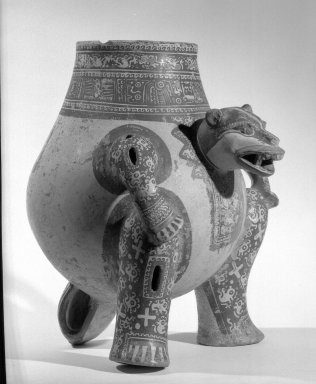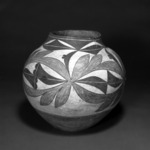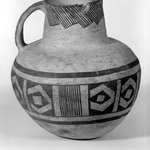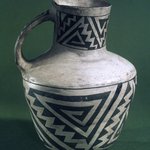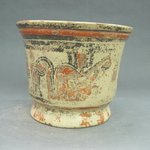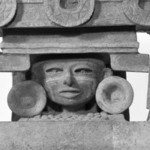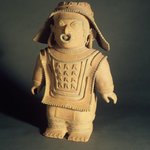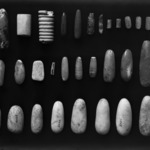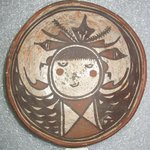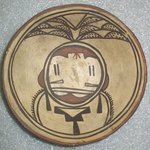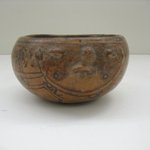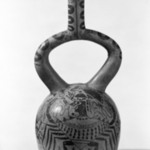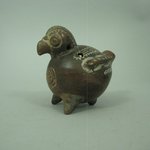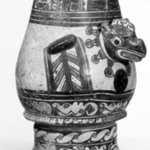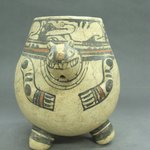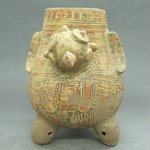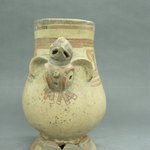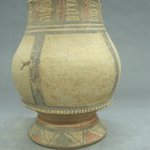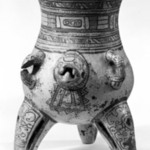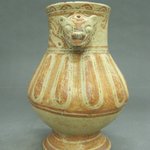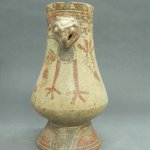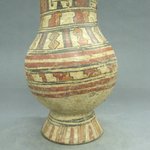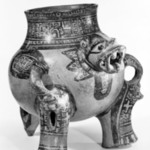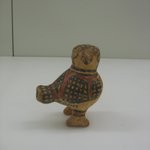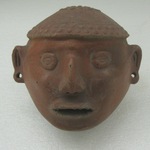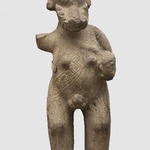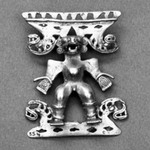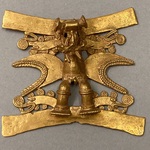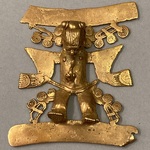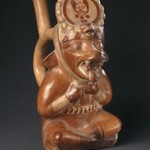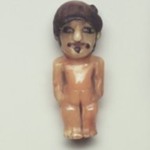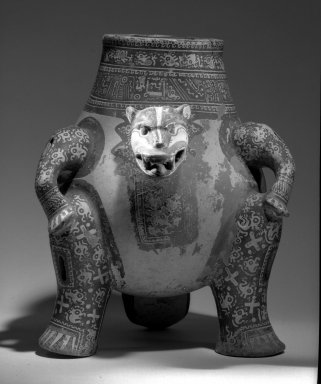
Jaguar Effigy Vessel
Arts of the Americas
The representation of the jaguar as a fearsome and powerful predator reaches its pinnacle in this pear-shaped, highly decorated jar. The blood-stained open mouth, pronounced incisors, and crouching stance convey that this is an intimidating species to be respected. The black-and-white patterned areas, made up of stylized jaguar heads, imitate the animal’s spotted coat, and the anthropomorphic pose, with hands on knees, is standard in Costa Rican depictions of shamans, who have the power to transform themselves into animals and move between the natural and supernatural realms.
CULTURE
Greater Nicoya
MEDIUM
Ceramic, pigment
DATES
1000–1350 CE
DIMENSIONS
13 3/8 x 10 13/16 in. (34 x 27.5 cm) (show scale)



COLLECTIONS
Arts of the Americas
ACCESSION NUMBER
48.140.2
CREDIT LINE
A. Augustus Healy Fund
CATALOGUE DESCRIPTION
Large pear-shaped tripod jar with modeled jaguar features. Two legs and a tail form the tripod supports, and the upper section has an elaborately modeled jaguar head framed by two arms with hands resting on the legs. Practically the entire vessel is covered with painted designs in red, white and black referred to as Pataky Polychrome, Period VI.
Condition: good; some of the surface decoration is abraded.
EXHIBITIONS
MUSEUM LOCATION
This item is not on view
CAPTION
Greater Nicoya. Jaguar Effigy Vessel, 1000–1350 CE. Ceramic, pigment, 13 3/8 x 10 13/16 in. (34 x 27.5 cm). Brooklyn Museum, A. Augustus Healy Fund, 48.140.2. Creative Commons-BY (Photo: Brooklyn Museum, 48.140.2_view1_acetate_bw.jpg)
IMAGE
overall, 48.140.2_view1_acetate_bw.jpg. Brooklyn Museum photograph
"CUR" at the beginning of an image file name means that the image was created by a curatorial staff member. These study images may be digital point-and-shoot photographs, when we don\'t yet have high-quality studio photography, or they may be scans of older negatives, slides, or photographic prints, providing historical documentation of the object.
RIGHTS STATEMENT
Creative Commons-BY
You may download and use Brooklyn Museum images of this three-dimensional work in accordance with a Creative Commons license. Fair use, as understood under the United States Copyright Act, may also apply.
Please include caption information from this page and credit the Brooklyn Museum. If you need a high resolution file, please fill out our online application form (charges apply).
For further information about copyright, we recommend resources at the United States Library of Congress, Cornell University, Copyright and Cultural Institutions: Guidelines for U.S. Libraries, Archives, and Museums, and Copyright Watch.
For more information about the Museum's rights project, including how rights types are assigned, please see our blog posts on copyright.
If you have any information regarding this work and rights to it, please contact copyright@brooklynmuseum.org.
RECORD COMPLETENESS
Not every record you will find here is complete. More information is available for some works than for others, and some entries have been updated more recently. Records are frequently reviewed and revised, and we welcome any additional information you might have.
